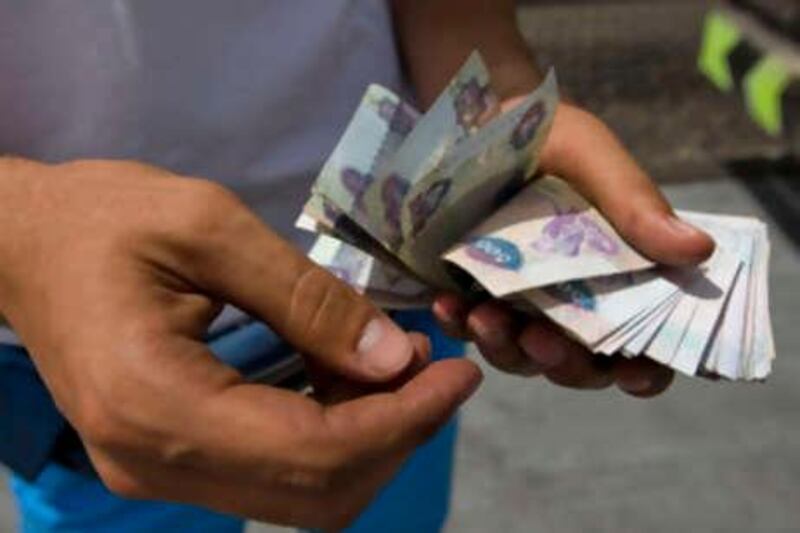The Government acted forcefully yesterday for a third straight day to prevent the global credit crisis from hitting home, announcing it will pour another Dh70 billion (US$19.05bn) into the country's banks in an action aimed at helping support the economy. The funds will make it easier for lenders to extend financing to major companies that need to make sizeable payments on existing debt or fund their operations in the coming months, analysts and industry officials said. Companies have faced concern they will be unable to borrow enough in international markets to repay debts and finance crucial infrastructure and development projects amid the current credit crunch. "These actions underline the willingness and ability of the federal authorities to support entities that are considered systemically important for the UAE economy," said Tristan Cooper, an analyst at Moody's Investors Service, the international rating agency. The UAE's announcement dovetailed with plans by governments in Europe and the US to buy stakes in local banks and pour money into their own banking systems. The UK and Europe are moving to nationalise significant chunks of their financial system, while the US government yesterday announced it would inject $250bn into banks through preferred stock purchases. "This is an essential short-term measure to ensure the viability of America's banking system," said George W Bush, the US president. Stock markets around the world rallied on the news. Interbank lending rates, which track how much banks charge each other for short-term funds, fell in a sign that the credit crunch may finally be easing. The three-month London interbank offer rate (Libor), which provides the basis for trillions of dollars worth of international lending, fell to 4.64 per cent from 4.82 per cent on Friday, its highest level since December. The three-month Emirates interbank offer rate (Eibor), which has more than doubled since June, declined to 4.67 from 4.71 on Monday. In the UAE, authorities have been moving aggressively to protect the economy since Sept 22, when the Central Bank announced it would provide Dh50bn of emergency funds to banks in an effort to encourage lending between the country's banks, which like many financial institutions have largely been cut off from global capital markets. That has forced most of them to restrict lending. Still, local banks have not used last month's Central Bank lending facility, even after the government made the funds available at a lower price late last week, according to bankers. The Government did not say precisely how it will deploy the new funds, but it did specify that the Ministry of Finance and Economy and the Central Bank will create a committee charged with injecting the money into local banks, according to orders from Sheikh Mohammed bin Rashid, Vice President of the UAE and Ruler of Dubai, according to WAM, the government news agency. Neither the Central Bank nor the Ministry of Finance responded to inquiries for further details. Bankers expect the government to place the new funds directly into local bank accounts so they can support more lending. "The best thing for the market right now would be for them to put the money in as direct deposits. That's what I hope for," said a Dubai-based banker. UAE companies, including Dubai government-linked corporations, have taken on large debts in recent years that have increasingly drawn the scrutiny of investors and ratings agencies. The Dubai Government and companies linked to it have debts of more than Dh172bn, an amount that exceeds the emirate's 2006 gross domestic product, according to Moody's. The number would be "significantly higher" if unreported debt were included, the agency said. Some of those entities need large amounts of cash. Both Dubai World and Borse Dubai, for example, must repay more than $5bn in foreign currency loans by the end of this year, according to Merrill Lynch. Yields on some of that debt have risen sharply. Some of the bonds of Nakheel, one of Dubai's biggest developers, are traded at yields comparable to distressed debt, Hasnain Malik, an economist with Citigroup wrote in a research note. "That implies that the debt market is taking seriously the chance that there could be some kind of default there," Mr Malik said on Monday. But Mr Malik and other analysts said the UAE Government's actions demonstrate that the country will work through its federal structure to back companies that need financing. "In the worst-case scenario that Dubai's economy is endangered by a sustained liquidity squeeze, it is noteworthy that cash-rich Abu Dhabi has already signalled its willingness to respond via federal policy mechanisms," Mr Malik said. In an statement, Nakheel said the international credit crisis has distorted markets across the globe. The pricing of some of its debt "has similarly been affected and the current market pricing is not reflective of the credit quality". tpantin@thenational.ae
Relief as UAE adds Dh70bn to banks
The Government acts forcefully for a third straight day in bid to help support the UAE's economy.

Editor's picks
More from the national





